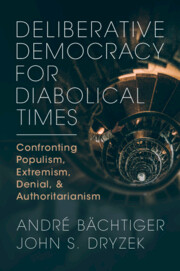 Deliberative Democracy for Diabolical Times
Deliberative Democracy for Diabolical Times Book contents
- Deliberative Democracy for Diabolical Times
- Deliberative Democracy for Diabolical Times
- Copyright page
- Contents
- Preface
- 1 An Introduction for Diabolical Times
- 2 Deliberation for Realists and Skeptics
- 3 Democracy in a Diabolical Soundscape
- 4 How to Deliberate with (and against) Populists
- 5 How to Deliberate with (and against) Extremists
- 6 How to Deliberate with (and against) Deniers
- 7 How to Deliberate with (and against) Authoritarians
- 8 How to Deliberate with Everybody
- 9 How to Renew a Deliberative Democracy
- References
- Index
6 - How to Deliberate with (and against) Deniers
Published online by Cambridge University Press: 28 March 2024
- Deliberative Democracy for Diabolical Times
- Deliberative Democracy for Diabolical Times
- Copyright page
- Contents
- Preface
- 1 An Introduction for Diabolical Times
- 2 Deliberation for Realists and Skeptics
- 3 Democracy in a Diabolical Soundscape
- 4 How to Deliberate with (and against) Populists
- 5 How to Deliberate with (and against) Extremists
- 6 How to Deliberate with (and against) Deniers
- 7 How to Deliberate with (and against) Authoritarians
- 8 How to Deliberate with Everybody
- 9 How to Renew a Deliberative Democracy
- References
- Index
Summary
Denial means rejecting the best knowledge we have about the state of the world. In its extreme (but not rare) manifestations, denial means that no amount of evidence or argument can change that rejection. The main forms of denial dealt with here concern climate change, Holocaust, election results, and pandemic. Chapter 6 examines the sources of denial in both the psychology of identity and in the political economy, which involves powerful interests such as fossil fuel corporations organizing denial, before moving on to the range of communicative responses to denial. The discussion here begins with the more obvious (and likely ineffective) responses of presenting the facts and promoting objectivity. More promising deliberative approaches involve communication and rhetoric that might reach denial via discursive bridges, and sometimes even draw deniers into deliberative interactions. If that fails, denial might be diverted or kept out of places in deliberative systems where it can do the most damage.
Keywords
- Type
- Chapter
- Information
- Deliberative Democracy for Diabolical TimesConfronting Populism, Extremism, Denial, and Authoritarianism, pp. 132 - 146Publisher: Cambridge University PressPrint publication year: 2024


